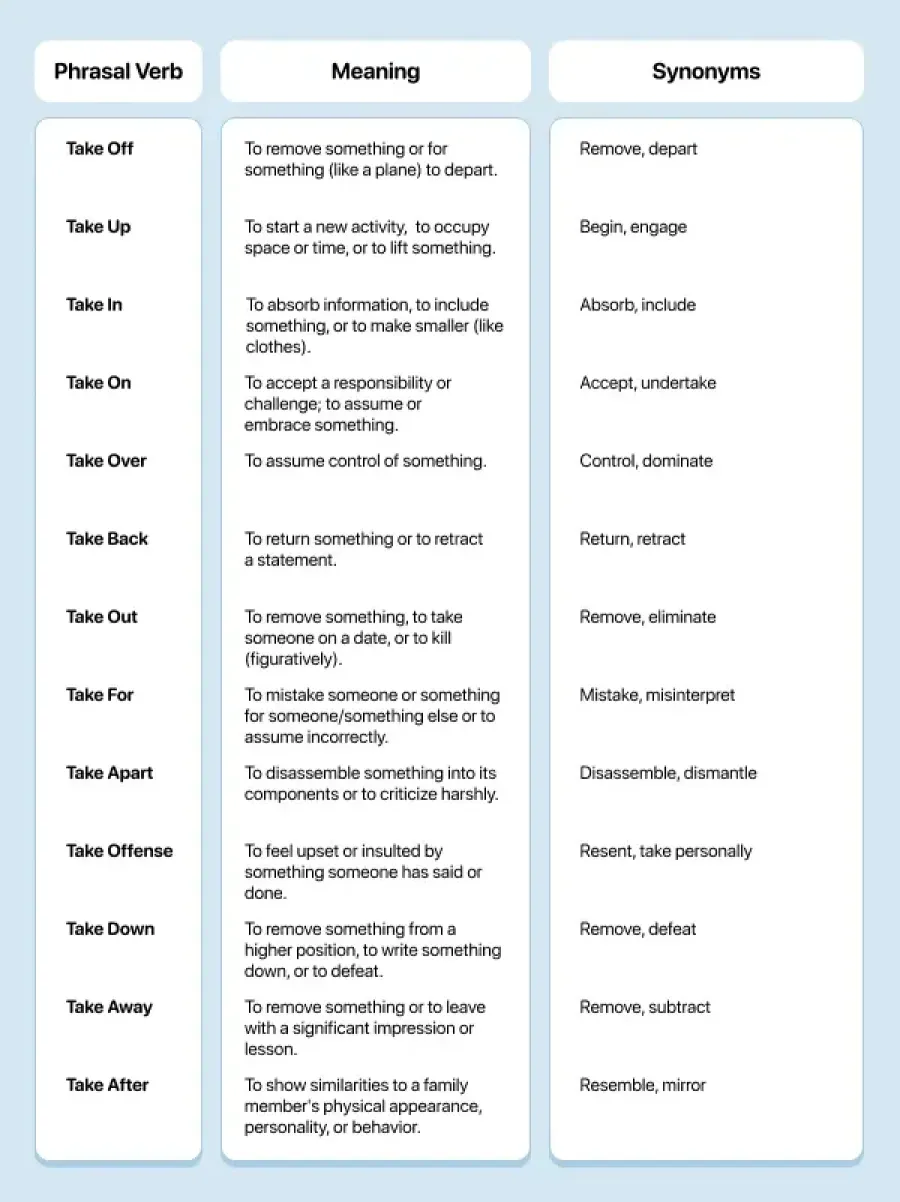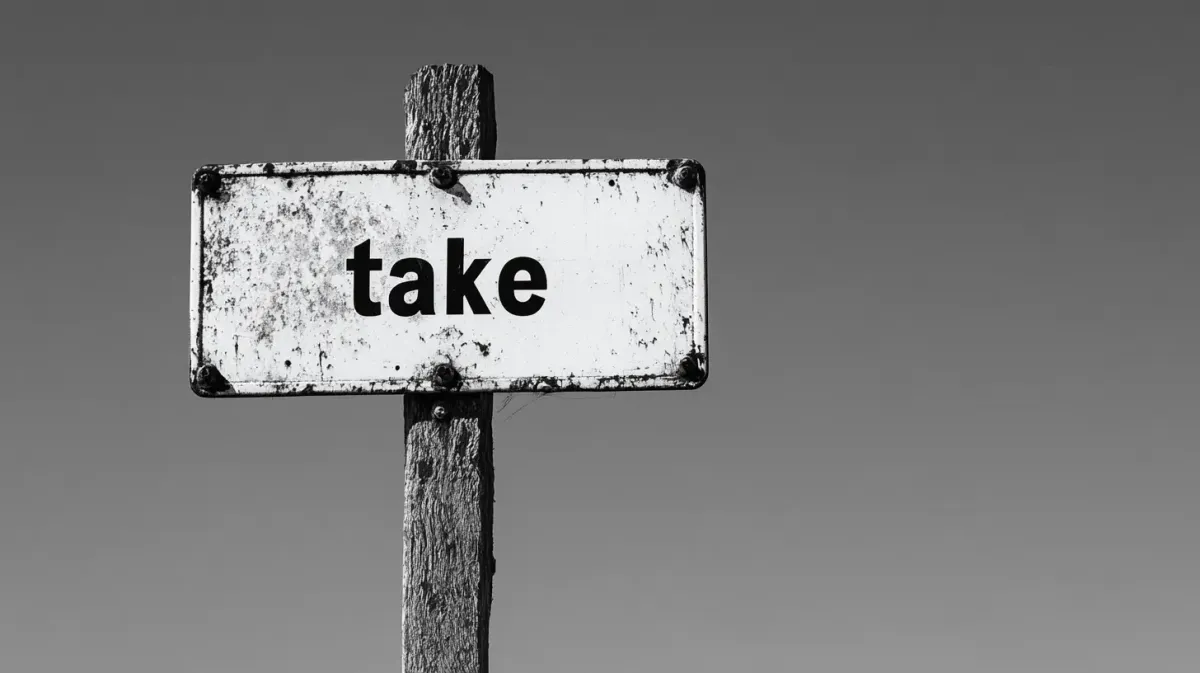Phrasal verbs are the secret sauce of English fluency, adding depth and variety to the way we express ourselves. Among the most versatile verbs in English, "take" combines with different particles to create a wide range of meanings. From everyday situations to professional conversations, these phrasal verbs with "take" pop up everywhere. This guide will help you master them with ease and confidence!
What are phrasal verbs?
Phrasal verbs are created by a verb and one or more particles (like prepositions or adverbs), and together, they form a unique meaning. For example, "take" means to grab or hold something, but add "off" and "take off" can mean to remove something or to leave quickly. Mastering phrasal verbs with "take" is essential to understanding and using English naturally.
Quick recap table

The most popular phrasal verbs with "Take"
Here are the essential phrasal verbs with "take" with examples:
1. Take Off
Meaning: To remove something or for something (like a plane) to depart.
Example:
- "Take off your hat to nobody." — Moby Dick by Herman Melville
- "He takes off his coat and sits by the fire to warm himself." — Wuthering Heights by Emily Brontë
2. Take Up
Meaning: To start a new activity, to occupy space or time, or to lift something.
Example:
- "They take up their tools every morning and work until dusk." — Hard Times by Charles Dickens
- "She decided to take up painting as a way to pass the long winter evenings." — Little Women by Louisa May Alcott
3. Take In
Meaning: To absorb information, to include something, or to make smaller (like clothes).
Example:
- "We must take in the orphaned children; there is no other choice." — Little Women by Louisa May Alcott
- "He paused, as if to take in the weight of her words before responding." — Pride and Prejudice by Jane Austen
4. Take On
Meaning: To accept a responsibility or challenge; to assume or embrace something.
Example:
- "I will take on this challenge, no matter the cost." — Pride and Prejudice by Jane Austen
- "He was ready to take on any task presented to him." — Moby-Dick by Herman Melville
5. Take Over
Meaning: To assume control of something.
Example:
- "He takes over the duties of the captain when the latter falls ill." — Moby-Dick by Herman Melville
- "She takes over the household, ensuring everything runs smoothly in her father’s absence." — Little Women by Louisa May Alcott
6. Take Back
Meaning: To return something or to retract a statement.
Example:
- "The soldier takes back the flag, holding it tightly in his hands." — The Red Badge of Courage by Stephen Crane
- "He takes back his promise, leaving her in a state of disbelief." — Wuthering Heights by Emily Brontë
7. Take Out
Meaning: To remove something, to take someone on a date, or to kill (in a figurative sense).
Example:
- “She takes out a letter from her bag and reads it quietly.” — The Adventures of Sherlock Holmes by Arthur Conan Doyle
- “He takes out a small notebook and begins to jot down his thoughts.” — The Picture of Dorian Gray by Oscar Wilde
8. Take For
Meaning: To mistake someone or something for someone/something else or to assume incorrectly.
Example:
- “He takes her for a stranger, though her face stirs a distant memory.” — Pride and Prejudice by Jane Austen
- “The traveler takes the ruins for a place of rest, unaware of its haunting history.” — Dracula by Bram Stoker
Note: The expression "Take for granted" is related and means to assume that something or someone will always be available or certain without proper appreciation. It can also refer to failing to value someone or something appropriately.
Example:
- "I take nothing for granted, and therefore I am not easily deceived." — The Count of Monte Cristo by Alexandre Dumas
9. Take Apart
Meaning: To disassemble something into its components, either literally or figuratively (e.g., to criticize harshly).
Example:
- “He takes apart the clock, fascinated by the intricate mechanisms within.” — Twenty Thousand Leagues Under the Sea by Jules Verne
- “She takes apart his argument piece by piece, leaving him at a loss for words.” — Jane Eyre by Charlotte Brontë
10. Take Down
Meaning: To remove something from a higher position, to write something down, or to defeat someone or something.
Example:
- “He takes down the painting, wiping away the dust with care.” — The Picture of Dorian Gray by Oscar Wilde
- “She takes down every word he says, her pen moving with urgency.” — Anna Karenina by Leo Tolstoy
11. Take Away
Meaning: To remove something or to leave with a significant impression or lesson.
Example:
- “The melody takes away her sorrow, if only for a fleeting moment.” — Wuthering Heights by Emily Brontë
- “He takes away the tools, leaving the work unfinished.” — Great Expectations by Charles Dickens
12. Take After
Meaning: To show similarities to a family member, either in physical appearance, personality, or behavior.
Example:
- “She takes after her mother, both in beauty and in wit.” — Pride and Prejudice by Jane Austen
- “He takes after his father, sharing the same stubborn resolve.” — David Copperfield by Charles Dickens
Now that you’re equipped with this guide, it’s time to take up the habit of practicing these phrasal verbs. Incorporate them into your daily conversations, and watch your confidence soar! Ready to take on the challenge?
FAQ
What’s the best way to practice phrasal verbs like “take”?
The best way is to practice them in context. Use them in sentences that reflect real-life situations, write your own examples, or try incorporating them into conversations.
How can I hear phrasal verbs being used naturally?
Watch English movies, TV shows, or listen to podcasts. These are great resources for hearing how native speakers use phrasal verbs in everyday situations.
Are there tools to help memorize phrasal verbs?
Yes, creating flashcards is a great technique. Write the phrasal verb on one side and its meaning with examples on the other for effective memorization.
















